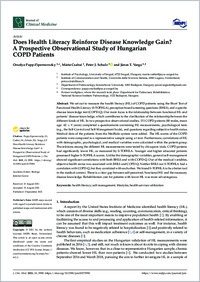Does health literacy reinforce disease knowledge gain? : a prospective observational study of hungarian COPD patients
- Papp-Zipernovszky, Orsolya Institute of Psychology, University of Szeged, Szeged, Hungary
- Csabai, Márta Institute of Psychology, University of Szeged, Szeged, Hungary
- Schulz, Peter J. Institute of Communication and Health (ICH), Facoltà di comunicazione, cultura e società, Università della Svizzera italiana, Svizzera
- Varga, János T. Department of Pulmonology, Semmelweis University, Budapest, Hungary
-
03.09.2021
Published in:
- Journal of clinical medicine / Jiménez-García, Rodrigo. - MDPI. - 2021, vol. 10, no. 17, p. 13
English
We set out to measure the health literacy (HL) of COPD patients using the Short Test of Functional Health Literacy (S- TOFHLA), perception-based screening questions (BHLS), and a specific disease knowledge test (COPD-Q). Our main focus is the relationship between functional HL and patients’ disease-knowledge, which contributes to the clarification of the relationship between the different kinds of HL. In two prospective observational studies, 151 COPD patients (80 males, mean age: 62 ± 9 years) completed a questionnaire containing HL measurements, psychological tests (e.g., the Self-Control and Self-Management Scale), and questions regarding subjective health status. Medical data of the patients from the MedSole system were added. The HL scores of the COPD patients were compared to a representative sample using a t-test. Furthermore, correlations of HL with demographic, psychological, and medical variables were calculated within the patient group. The relations among the different HL measurements were tested by chi-square trials. COPD patients had significantly lower HL, as measured by S-TOFHLA. Younger and higher educated patients possessed higher S-TOFHLA scores. Unlike the demographic variables, general self-management showed significant correlations with both BHLS and with COPD-Q. Out of the medical variables, objective health status was associated with BHLS and COPD-Q. Neither BHLS nor S-TOFHLA had a correlation with COPD-Q, but they correlated with each other. We found S-TOFHLA to be a better tool in the medical context. There is a clear gap between self-perceived/functional HL and the necessary disease knowledge. Rehabilitation care for patients with lower HL was more advantageous.
- Language
-
- English
- Classification
- Medicine
- License
- Open access status
- gold
- Identifiers
-
- RERO DOC 333717
- DOI 10.3390/jcm10173990
- ARK ark:/12658/srd1319312
- Persistent URL
- https://n2t.net/ark:/12658/srd1319312
Statistics
Document views: 220
File downloads:
- Texte intégral: 280
